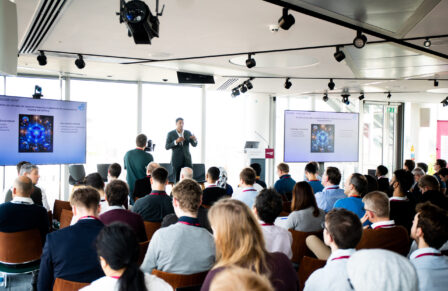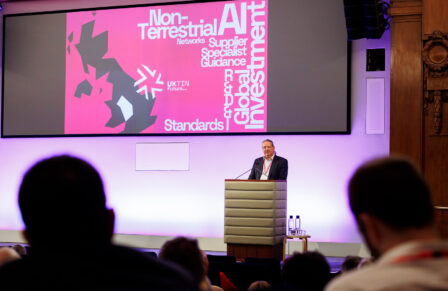Leading expert in responsible and ethical tech shares her vision for an equitable digital future
Posted 6 Mar 2023
This International Women’s Day Digital Catapult’s trailblazing Board share their insights…
A key part of Digital Catapult’s mission to accelerate digital adoption is working with the UK’s trailblazing founders, technology experts, and business leaders. To celebrate International Women’s Day and the crucial role women have played in accelerating the digital future, we sat down with our Board to hear more about their vision for an equitable digital future and how we can get there. In this interview we caught up with our newly appointed board member Jessica Cecil.
Jessica is a leading media industry figure and an expert in the field of disinformation, currently working as a consultant to media and tech companies. She founded the Trusted News Initiative (TNI), the world’s only alliance of major international tech companies and news organisations to counter the most harmful disinformation in real time.
The TNI’s membership includes Meta, Google, Twitter and Microsoft alongside the BBC, AFP, AP, Reuters and other leading global news providers, and its members have a fast-alert system to counter the most harmful disinformation.
Jessica’s media industry leadership experience was honed over a long career at the BBC, which serves an audience of 450 million people around the world. As Chief of Staff to four Directors-General, she had a track record of creating and leading global alliances responding to the changes tech is having on audiences’ lives. Before the TNI, she led a 30 partner-strong initiative to get the world to learn how to code. The result was the creation, manufacture and distribution of a codeable computer, the micro:bit. 6 million micro:bits have now been sold in 50 countries and are used by 25m children from Singapore to Finland.
Jessica’s background is as a news journalist and documentary maker. She was an international news producer and assistant editor of BBC Newsnight. She is an Emmy nominee for the prime time TV science documentary Human Instinct.
Jessica is also a Trustee of the University of Bristol, where she chairs the Equity, Equality, Diversity and Inclusion Oversight Committee. She sits on the Council of Advisors for RAND Europe and is an Adjunct Fellow of the Queen Elizabeth II Leadership School at Chatham House, the Royal Institute for International Affairs.
What do you feel are the strengths of the UK technology ecosystem? How is it creating a more conducive environment for women to succeed than other ecosystems like Silicon Valley?
This could be a fantastic time for women in tech in the UK – and I hope it will be. First, the industry is expanding at a jaw-dropping rate as a result of huge leaps in AI, creating huge opportunities. For instance, ChatGPT was launched only 3 months ago but it’s said there are already hundreds of start-ups being founded on the back of its technology, disrupting business as usual. At the same time we have a fantastic environment in the UK nurtured by our university sector. Not only does the UK have seventeen of the world’s top 100 universities, but those universities are spending millions incubating tech spinouts that can use their world class research to solve real world problems. Bristol University, for example, is building a second campus in the city centre Temple Quarter with enterprise at its heart, and Oxford University Innovation formed 31 new companies in 2021 alone.
At the head of these world-class universities are a generation of women leaders. Starting this summer Oxford, Cambridge, Manchester and Bristol will all be headed by women Vice-Chancellors – visible symbols that women can succeed in world class and previously male dominated areas.
Even though the technology ecosystem has many strengths, the industry still needs to do more to attract and retain women, and figure out how to support their undoubted talents.
In which area would you like to see more progress? Where do we need to direct our tools, policy, and talent to ensure that women have the support they need to have a successful career in technology?
When you deconstruct the tech pipeline – from building women’s skills and qualifications to going out into the market and setting up companies and establishing women’s careers, you constantly hit bottlenecks.
At the very start of that pipeline you will find that the single biggest gender gap in A-Levels is between boys and girls studying computer sciences – this despite a 17.8% increase in girls taking the subject since 2021.
At the same time there has been a spike in demand for undergraduate places for computer science – from 2021-2, it went up 13 % according to UCAS. This now means it is sometimes harder to get a computer science place at a top university than it is to read many other mainstream subjects. That means a lot of very talented women are being turned away before being able to start a career, despite the demand for women in the sector. Getting more women into tech in the future means meeting that demand by increasing places for computer science students.
At the other end of the pipeline, women are now founding more companies than ever before according to the Rose Report. However, women entrepreneurs are reporting that they are finding it far harder than men to receive funding. In the UK, according to a 2019 study, 83% of venture capital funding went to all-male companies. A more recent study puts venture funding to all-female businesses at 6%.
These inequalities throughout the different stages of education and beyond expose the needs to improve every part of the pipeline to attract and retain talent in the tech sector.
The theme of IWD this year is ‘embrace equity’. At Digital Catapult we’ve been thinking a lot about how the metaverse can be an environment where stakeholders of all sizes feel empowered. Could you tell us what an equitable digital future looks like to you?
There are competing visions of the metaverse. Potentially each metaverse will create places where you can take your avatar, meet others, learn, explore and socialise. You can only interact happily in these virtual communities if you feel the environment around you is as supportive and safe as the physical worlds you choose to hang out in. Unfortunately this currently isn’t the case, looking at social media as an example we can see the horrifying abuse women receive based solely on their gender.
With the metaverse, creating a sense of safety and autonomy should be easier from the outset because each metaverse will have a gatekeeper by design. It’s essential that these gatekeepers listen to women and design the rules of these worlds with their advice in mind – just seeing how things turn out is not good enough. We have all failed if prominent women find themselves trolled and abused in the metaverse, just as they are now on social media.
How can our male allies support us in building an equitable digital future?
The tech industry itself remains very male. There is no doubt that this very male culture contributes to the alarming fact that, according to InnovateHer, women under the age of thirty-five are 45% more likely to quit the tech sector than men. The 2019 Women in Tech Survey gave two clear examples of why: 22% of women believe they are disadvantaged in promotion by their gender, and the wage gap in the tech sector remains massive.
I would say to men who find themselves leading management teams or boards that are almost entirely male, ask yourself what is your culture? and what are you doing wrong? Saying there aren’t enough credible women to recruit is not an answer.
What advice has been helpful for you throughout your career that you would like to share with other women?
Women and men have been very generous with their advice across my career, particularly on how to prioritise the different strands of your career, and what you should be careful not to overlook. Specific advice on how to keep your career on track when you have children is essential. Look for it and take it. It’s important to be kind to yourself – work out how to move on from where you find yourself, not how you got there.
What is one piece of advice would you give to someone interested in working in the technology industry?
Be curious. Be enthusiastic. Your evident enthusiasm, your energy and excitement about what you do, will be the rocket fuel of your career. Don’t suppress it or fritter it away.
At Digital Catapult we are committed to building an organisation that is fully representative and reflective of UK society. You can find out more about our equality, diversity and inclusion charter here.









